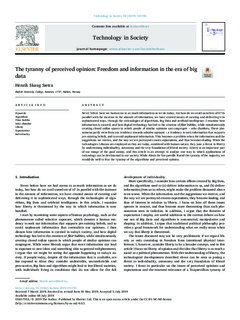The tyranny of perceived opinion: Freedom and information in the era of big data
Journal article, Peer reviewed
Published version
Date
2019-07-08Metadata
Show full item recordCollections
Abstract
Never before have we had access to as much information as we do today, but how do we avail ourselves of it? In parallel with the increase in the amount of information, we have created means of curating and delivering it in sophisticated ways, through the technologies of algorithms, Big Data and artificial intelligence. I examine how information is curated, and how digital technology has led to the creation of filter bubbles, while simultaneously creating closed online spaces in which people of similar opinions can congregate – echo chambers. These phenomena partly stem from our tendency towards selective exposure – a tendency to seek information that supports pre-existing beliefs, and to avoid unpleasant information. This becomes a problem when the information and the suggestions we receive, and the way we are portrayed creates expectations, and thus becomes leading. When the technologies I discuss are employed as they are today, combined with human nature, they pose a threat to liberty by undermining individuality, autonomy and the very foundation of liberal society. Liberty is an important part of our image of the good society, and this article is an attempt to analyse one way in which applications of technology can be detrimental to our society. While Alexis De Tocqueville feared the tyranny of the majority, we would do well to fear the tyranny of the algorithms and perceived opinion.

